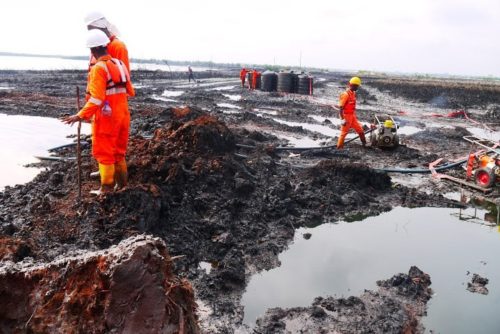Ogonis still suffering spills despite not producing oil since 1993

By Obiabin Onukwugha
Last week, fresh oil spill was reported in Bodo community, Gokana local government area of Rivers State.
Bodo Community has suffered several oil spills and is said to be the community with highest incidents of oils spills globally.
The latest spill, according to community sources, occured in Sugi area of the community on Thursday July 4, close to thr Trans-Niger Pipeline (TNP) operated by Shell Petroleum Development Company of Nigeria (SPDC) Ltd., where a previous spill was also reported last year.
Oil spills in Ogoni drew international attention after the death of late environmentalist, Ken Saro-Wiwa who was pushing for environmental justice and fair treatment for the Ogonis and the Niger Delta at large.
The United Nations Environmental Programme, UNEP after a study on the environment recommended for immediate cleanup of spill sites. While the project has continued with snail pace, incidents of oil spill has continued unabated.
Incidentally, Ogoni has stopped producing oil for over two decades after the people shut down their oil wells in protest of their slain sons.
Oil spills have great impacts, not just on the health of community people, but on both the ecosystem and biodiversity.
Ogoni as a Niger Delta community is a rain forest with regular rain falls. When rain falls, spilled oil are washed through several land areas to water bodies thereby contaminating both water and lands, which are sources of livelihoods of the people who are predominantly farmers and fisherfolks.
The spills mostly occurs on the Trans-Niger Pipeline that transport crude from oil facilities across the Niger Delta to the Bonny terminal operated by the SPDC.
A Community Leader from the area, Bari-ara Kpalap, has lamented the devastation suffered by people in the area as a result of the incessant spills.
Kpalap cited the situation where an oil spill that occured since 2020 in Kegbara Dere (K-Dere) community has left a vast land polluted.
“We are on the Trans-Niger Pipeline in Kegbara Dere. What you see here is a spill from the Trans-Niger pipeline in Kegbara Dere (K-Dere). The Trans-Niger pipeline transports crude oil from all other fields outside of Ogoni to the Export Terminal at Bonny.
“For now, there is no oil production in Ogoni, oil from Ogoni is not part of the oil that is being transported to the Terminal at Bonny. The site we are is a spill site. The spill occured in 2020. If we have been here earlier before the rains, we would have been able to see the fresh crude oil that has lasted since 2020.
“These are all burns that have caked. And because of this pollution which has been left unattended to, the community has been unable to use anything around this area.
“If you look at this side you will see the rafia farm where we tapped palm wine. This other side is palm tree that we also cut and use the palm frond as well as the palm fruits. We can no longer use all these because this entire area is polluted.
“I am aware that the leadership of the community had on several occasions reported this incident and the situation to the polluter, Shell. Although Shell is no longer in operation here in Ogoni since it suspended its operations in 1993, as a result of the campaign against environmental injustice by the Ogoni people, up till today, this place is like this,” Kpalap said in an interview with NatureNews.
Kpalap, who is also an environmental activist said several illnesses including cancer and respiratory diseases in Ogoni communities have been linked to polluted air inhaled by the people.
He said: “As you know, this community and other parts of Ogoni are predominantly farmers and fisherfolks. We depend on farming for our own subsistence living.
“Unfortunately, oil production has removed this aspect of our own existence from us. Because we do not have any other source of drinking water, we still drink from this one.
“If you go to the adjourning homes and see any well being dug, what comes out of it as water is oil. I can take you to several water wells that have been dug, what you find come out of it is oil. But the people still remove the water from the oil and drink because there is no alternative.
‘And what we have been experiencing is high level of diseases, sicknesses that we never knew before. Today, there is prevalence of cancer from this community. People are complaining of serious respiratory illnesses.”
Kpalap, who was former President of the Movement for Survival of Ogoni People (MOSOP), also lamented that oil exploitstory activities have reduced life expectancy for people of the Niger Delta.
“Today, in this community, if you are up to sixty years of age, you clap your hands to your God. Life expectancy in this community is not more than fifty. That is the situation we find ourselves in this community. Not only here, several other Ogoni communities that host oil production, this is what they suffer. Every community in Ogoni suffer one negative impact of oil production or the other.
“If you are not breathing the air, because the air carries the odour and send it even to the community of Kpaa; at the boundary with Akwa ibom state, you see those people there complaining of respiratory problems because of oil.
“So every community in Ogoni suffer one ailment as a result of oil production or the other. You know water is not stagnant, water flows underground and goes to every where and UNEP has confirmed that every water in Ogoni is polluted. That is our situation,” he stated.
Though environmental bodies have called for swift response in terms of JIV and remediation from the relevant agencies, there is the need for the federal government of Nigeria to tackle oil spills in the Niger Delta, whether through equipment failure or third party interference.
